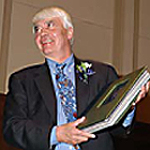Peter Glick, professor of psychology at Lawrence University, has been elected a Fellow in the American Psychological Society for his contributions to the advancement of psychological science. He is the first psychologist at Lawrence ever accorded Fellow status by the APS.
Glick was one of only 19 psychologists nationally awarded fellowship status in the first of two rounds of elections this year. Fellow status recognizes APS members who have made “sustained, outstanding
contributions” to the science of psychology in the areas of research, teaching and/or application.
Founded in 1988, the APS is dedicated to the advancement of scientific psychology and its representation at the national level. It seeks to promote, protect and advance the interests of scientifically oriented psychology in research, application, teaching and the improvement of human welfare. Of the organization’s current 14,260 members, only 1,703 hold Fellow status.
In announcing Glick’s selection, the APS cited him for “enhancing the reputation” of the organization and helping the APS establish itself “as the major voice for scientific psychology.”
“It’s very gratifying to have the national organization for scientific psychology recognize my research,” said Glick. “It’s nice to know that such contributions are valued and appreciated.”
A social psychologist, Glick’s research interests focus on both the subtle and the overt ways in which prejudices and stereotypes foster social inequality. In research he co-authored, Glick introduced the
concept of “ambivalent sexism,” asserting that not just hostile, but subjectively benevolent views of women as pure, but fragile, reinforce gender inequality. Such “benevolent sexism,” Glick argues, rewards women for conforming to conventional gender roles and results in hostile attitudes toward women who fail to do so.
Glick and his research associate, Susan Fiske of Princeton University, developed the Ambivalent Sexism Inventory, which has since been administered to more than 30,000 people in 30 countries. The research earned them the Gordon Allport Intergroup Relations Prize from the Society for the Psychological Study of Social Issues in 1995.
“Peter’s election as APS Fellow puts him deservedly among a distinguished group of psychological scientists whose research greatly contributes to the growth of our knowledge,” said Fiske, former APS president from 2002-03. “His work has garnered an impressive array of adjectives from others in the field, including ‘innovative,’ ‘truly ground-breaking,’ ‘bold and clever’ and been hailed by as ‘important scholarly work’ and ‘sophisticated, both in its theoretical approach and its methods.'”
“Peter is one of those very rare scholars,” Fiske added, “whose insights can shape the direction of the field for decades.”
Glick serves on the editorial board of four professional journals, including the Journal of Personality and Social Psychology and Psychology of Women Quarterly and regularly delivers lectures at major conferences and universities across the country as well as abroad. A member of the Lawrence faculty since 1985, Glick earned his bachelor’s degree in psychology at Oberlin College and his Ph.D. in social psychology at the University of Minnesota.

